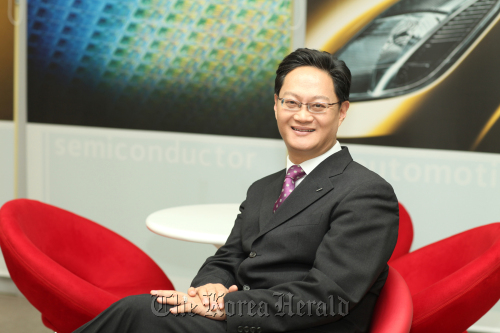Siemens Korea has been active in competing with foreign and domestic rivals over subcontracts of global conglomerates’ large-scale plants to be built in the Middle East, India and China.
With conglomerates’ aggressive expansion overseas, the Middle East, India and China have become huge markets, sparking seemingly endless demand for subcontracts of constructing plants and factories.
Un Min-su, vice president and head of industry sector of Siemens Korea, was careful but confident about sharing the company’s overseas operations. The vice president described the sector as a tightly held combination of technologies and solutions.
“We have all the items, solutions and references to build any kind of factory you want.”
 |
Siemens Korea vice president Un Min-su at his office in Yeoksam-dong, southern Seoul. (Siemens Korea.) |
The company seeks subcontracts to sell its solutions and controlling system to big―name conglomerates, said the vice president. If chosen in the bid, the construction of the plants will be the only operation in which the company is not engaged, the company said.
Siemens Korea is currently tendering subcontract bids for steel conglomerates’ plants in the Middle East, India and China. The firm has also bid on steel project and an engineering, procurement and construction project in China.
The company is pursuing a huge subcontract for Hyundai Motor Co.’s new plant to be built in a small city near Sao Paulo, Brazil. If selected, Siemens Korea will make the equivalent of one year’s profit.
Hyundai Heavy Industries, Hyundai Wia Corp., Samsung Electronics and Samsung Engineering Co. are among the clients of Siemens Korea.
A subsidiary of the German electrical and electronic engineering conglomerate, Siemens Korea is sustained by four major sectors, industry, infrastructure and cities, energy and health care.
Flagging innovation as the multinational conglomerate’s 160-year-old slogan, Siemens has emphasized a steady increase in obtaining patents and investing for research and development. The electric and electronic engineering giant invested about 5.3 percent of its total revenue in 2011 and about 5.2 percent in 2010.
Siemens is concentrating on the specialization and enhancement of market leadership as the core of Siemens’s business expansion.
“The company is careful about expanding business sectors. Unlike some huge conglomerates, we try to stick to our strongest sectors, seeking a higher degree of perfection,” he said.
The vice president also said that the company’s abundance in free cash flow, which amounts to $7.54 billion, adds to the stable management.
“Not many companies, including the conglomerates, have such a grand sum of free cash flow.”
In the eyes of the vice president, Siemens Korea is distinguished from non-German-based companies. Un chose the word “patient” to describe German-based subsidiary companies in Korea.
“Some U.S. companies, for example, tend to depend highly upon short-term performance,” he said. “We give our employees more chances to make up, and we still reap great business achievement as shown in the financial reports.”
Un revealed his personal affection for his company as he mentioned that it never ceased to care for its employees even during the global financial crisis. Siemens chose to freeze pay increases instead of pushing for layoffs like other corporations, Un said.
The vice president also spoke highly of Siemens’s standardized treatment of its staff that have equivalent positions but are in operations of different countries. He is treated equally as the head of industry sector when he goes to the headquarters in Germany, which is unusual for other multinational conglomerates.
By 2014, Siemens and its subsidiary companies set an objective to sell environmentally friendly products and solutions worth 40 billion euros ($51 billion). The companies’ green-energy portfolio includes thermal energy plants, energy-saving lamps, building automation and hydro- and air purification.
By Chung Joo-won (
joowonc@heraldcorp.com)








![[Today’s K-pop] Blackpink’s Jennie, Lisa invited to Coachella as solo acts](http://res.heraldm.com/phpwas/restmb_idxmake.php?idx=644&simg=/content/image/2024/11/21/20241121050099_0.jpg)